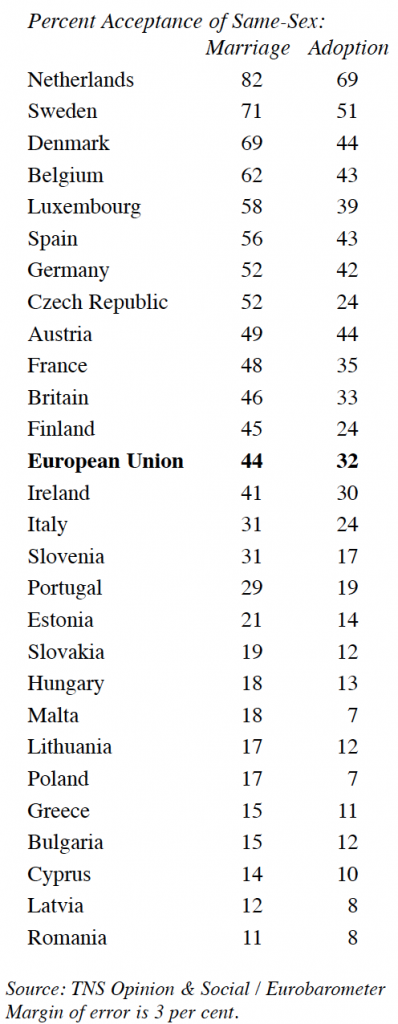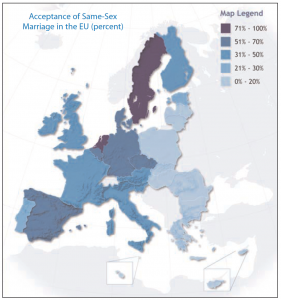PUBLIC OPINION on same-sex marrage and adoption show enormous variation from one European country to the next, according to a large-scale survey that covered all 25 current members of the European Union (EU), two countries in the process of joining, and two candidate countries. For all of the countries surveyed, under half of the sample populations favored same-sex marriage and a third approved of gay adoptions, but this finding may be misleading in light of this high level of variance.
 The study, conducted by TNS Opinion & Social / Eurobarometer, surveyed 29,152 people age fifteen and over in September and October 2006. The survey questionnaire took respondents through a wide range of issues related to EU membership, the general state of affairs in Europe and the world, and a range of social issues, including same-sex marriage and adoption. They were asked to agree or disagree with the following two statements: “Homosexual marriages should be allowed throughout Europe”; and “Adoption of children should be authorized for homosexual couples throughout Europe.” Thus their answers refer not to their own country but to Europe as a whole.
The study, conducted by TNS Opinion & Social / Eurobarometer, surveyed 29,152 people age fifteen and over in September and October 2006. The survey questionnaire took respondents through a wide range of issues related to EU membership, the general state of affairs in Europe and the world, and a range of social issues, including same-sex marriage and adoption. They were asked to agree or disagree with the following two statements: “Homosexual marriages should be allowed throughout Europe”; and “Adoption of children should be authorized for homosexual couples throughout Europe.” Thus their answers refer not to their own country but to Europe as a whole.
Of the many issues covered in the survey, these questions proved to be among the most divisive among the national populations polled, with same-sex marriage acceptance ranging from a high of 82 percent for the Netherlands to a low of eleven percent for Romania and twelve percent for Latvia. This issue also revealed an especially sharp division between East and West, i.e. between the the old NATO countries and the Warsaw Pact countries of the Cold War era (with the interesting exception of the Czech Republic). This may reflect the fact that the latter countries emerged only recently, after 1991, from Soviet domination with its generally conservative positions on social issues. However, the relative conservatism of two non-Soviet countries, Greece and Portugal, suggests that economic development may also be an underlying factor in shaping attitudes toward GLBT people.
Another striking pattern to emerge is the extent to which public opinion reflects the actual legal situation in these countries. Acceptance of same-sex marriage is highest in countries where marriage or its legal equivalent is currently on the books, which is the case in the Netherlands, Belgium, Spain, Sweden, and the UK. Most of the other countries of Western Europe—France, Germany, Scandanavia, Ireland, the Czech Republic, among others—also recognize same-sex couples as eligible for many benefits  of marriage. Presumably the legal situation reflects public opinion in these countries to a large extent; but it may also be the case that the existence of same-sex marriage as a legal reality has a liberalizing effect on public opinion.
of marriage. Presumably the legal situation reflects public opinion in these countries to a large extent; but it may also be the case that the existence of same-sex marriage as a legal reality has a liberalizing effect on public opinion.
One thing is clear: countries that have had an active gay rights movement for the longest are the ones most likely to have both legal protections and favorable public opinion on these issues. From a baseline of nearly universal rejection in the mid-20th century, an atmosphere of tolerance has evolved only slowly and painstakingly as a GLBT rights movement has taken hold in Europe and the reality of gay people has been acknowledged and embraced.




